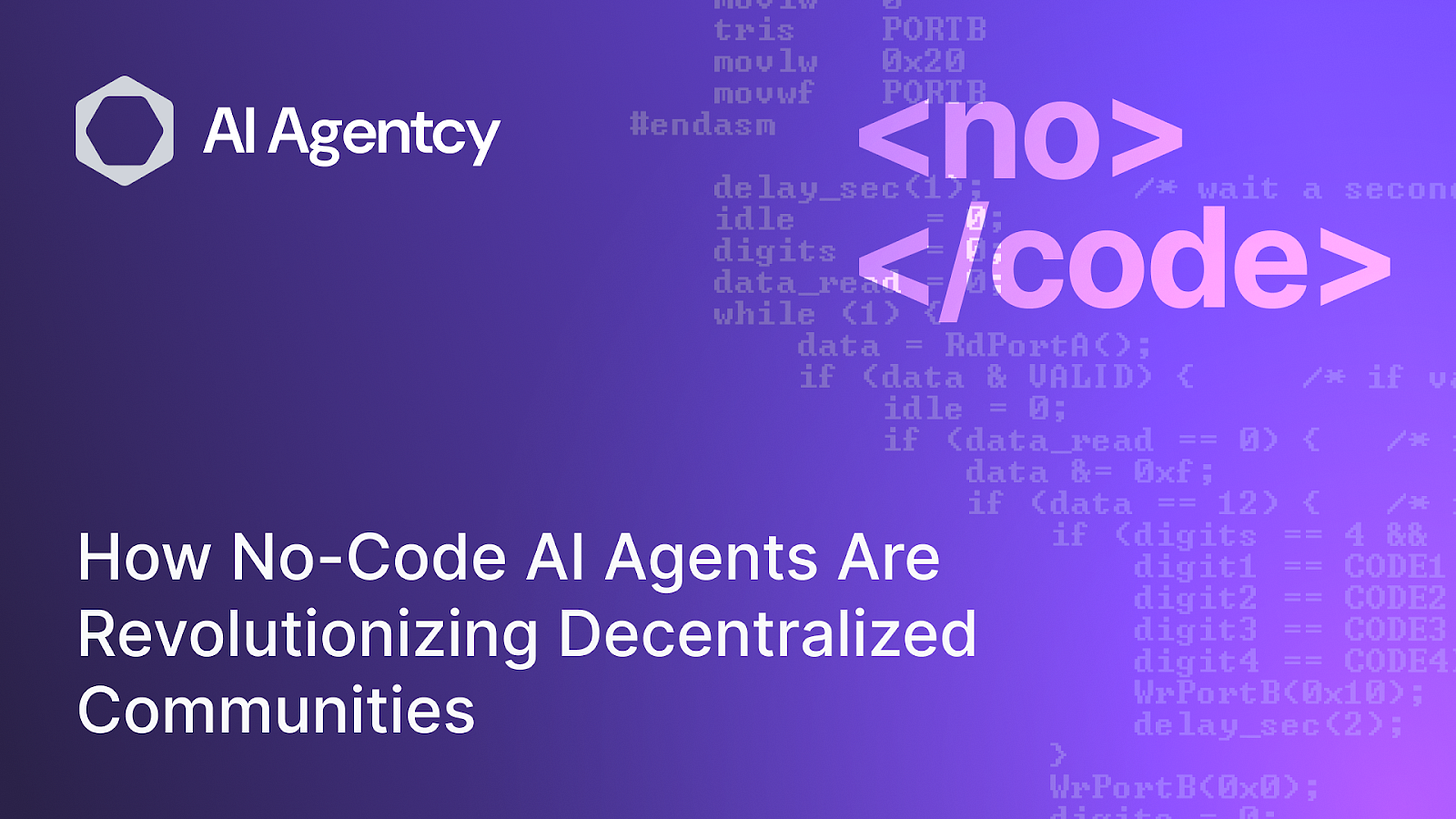How No-Code AI Agents Are Revolutionizing Decentralized Communities
AI is changing everything, but for most Web3 communities, it's been out of reach. Without coding skills, DAOs, DeFi projects, and decentralized platforms have struggled to integrate automation, relying on complex development or outside help. That's no longer an issue. No-code AI agents are putting automation in the hands of anyone, making it easy to deploy AI-driven tools without technical expertise.
How does this shift impact decentralized communities, and what new opportunities does it create? Let's break it down.
What Are No-Code AI Agents?
No-code AI agents remove the need for coding skills, so decentralized communities can use automation without technical barriers. These agents work through drag-and-drop tools, so users can set up AI-driven systems for tasks like data analysis, customer interaction, and process automation. Pre-trained models and adjustable settings give users control over how the AI functions, so it fits specific needs.
The demand for no-code AI platforms has surged. In 2023, the global market size reached $3.83 billion and is set to grow at a compound annual growth rate (CAGR) of 30.6%, with projections hitting $24.42 billion by 2030. This growth shows a shift toward AI solutions that work without technical expertise.
The AI Agentcy applies this system to the blockchain, allowing users to deploy tokenized AI agents across multiple chains. These AI agents operate on different blockchain networks, which expands their use in decentralized communities. Tokenization also adds economic value, so AI agents can be owned, traded, and monetized.
No-code AI tools remove barriers to automation and give more people access to AI-driven solutions. As these platforms expand, more decentralized communities will integrate AI into real-world applications without depending on developers.
Practical Use Cases in Decentralized Communities
Governance & DAOs
Artificial intelligence (AI) increases efficiency and transparency in decentralized autonomous organizations (DAOs). It automates tasks like proposal analysis, voting processes, and community moderation, reducing manual workloads and speeding up decision-making. A study from Stanford University proposes integrating decentralized Web3 governance with federated communication platforms, creating a sophisticated framework for dynamic oversight of AI development. This integration ensures that AI systems align with community values and operate ethically within decentralized structures.
DeFi & Finance
In the decentralized finance (DeFi) sector, AI plays a crucial role in automating trading strategies, risk assessment, and treasury management. AI-powered decentralized applications (DApps) have gained significant traction, with reports indicating that AI-driven DApps recorded 2.2 million unique active wallets, representing 8.5% of the total DApp market.This adoption signifies a growing trust in AI to manage complex financial operations, enhancing efficiency and security in DeFi platforms.
Web3 Social & NFTs
AI enhances user experiences in Web3 social platforms and non-fungible token (NFT) marketplaces by curating content, detecting fraudulent activities, and personalizing interactions. The integration of AI into these platforms has contributed to their growth, with AI-powered DApps accounting for a notable share of the market. This integration fosters safer and more engaging environments for users, promoting the adoption of decentralized social networks and NFT platforms.
Gaming & On-Chain Services
The gaming industry within the blockchain ecosystem has experienced remarkable growth, with AI significantly contributing to this expansion. In 2025, blockchain gaming recorded over 7 million unique active wallets daily, reflecting a 386% increase from the previous year. AI enhances gaming experiences by powering non-player characters (NPCs), generating dynamic environments, and facilitating player interactions. These advancements attract more players to blockchain-based games, positioning gaming as a leading sector in blockchain technology.
We can conclude that the integration of AI into decentralized communities is not merely a technological advancement; it represents a shift toward more efficient, secure, and user-centric platforms across various sectors.
AI Agents as Digital Assets
Co-Ownership, Staking, and Revenue Sharing
Tokenized AI agents allow multiple stakeholders to co-own, govern, and profit from AI-driven services. Instead of being controlled by a single entity, ownership is distributed through blockchain-based tokens. Staking mechanisms let users lock tokens in exchange for governance rights or passive income, creating a more decentralized and incentivized AI ecosystem.
Monetization Through AI Services
enterprise applications, data analysis, and Web3 governance. Organizations use AI for customer support, fraud detection, and smart contract execution, creating new economic models around AI-driven automation.
In NFT marketplaces and Web3 social platforms, AI assists with content moderation, asset valuation, and personalized recommendations. Some projects explore AI-generated NFT collections and automated community management, adding new ways to monetize digital assets.
Let’s Conclude… The Future of AI-Powered Web3
No-code AI agents are taking automation out of the hands of developers and putting it into the broader Web3 community. Decentralized projects can now integrate AI without technical barriers, transforming how work gets done in DAOs, DeFi, and beyond.
Tokenized AI ownership is redefining governance and economic participation, shifting control from corporations to the communities that use these technologies. The projects that embrace AI now will set the standard for the next phase of Web3 innovation.
Curious about how AI agents can bring real value to your project? Reach out to The AI Agentcy and see what's possible with our assistance.


